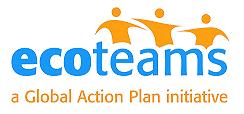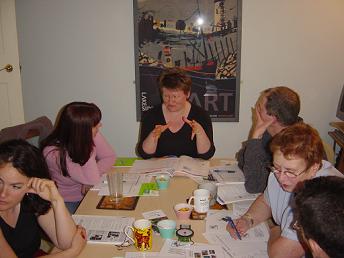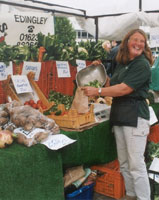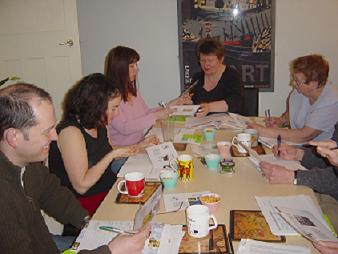
|
Home - Calendar - News - Directory - Resourcing - Site map |
ECOTEAMS []
MAKING SMALL CHANGES, MAKES BIG SAVINGS

What is an EcoTeam?
An EcoTeam is a group of 6-8 households who meet once a month for four months to share ideas and work together to learn simple yet effective changes to their lifestyles to become more environmentally friendly and save money.
How does it work?
The first meeting is for the group to meet each other and go over the details of the programme. Each member is given a guidebook, which contains a wide range of practical advice for living in a more environmentally friendly way. The EcoTeams are co-ordinated by Julie or Cathy from the charity Global Action Plan, whose roles are to support teams throughout the programme.

An EcoTeam discussing how they can become more environmentally friendly
The next three meetings look at the following topics in turn: Rubbish & Shopping, Energy & Transport and Water, with discussions and activities focusing on ways to reduce rubbish, energy consumption and water use. The following list gives a few examples of the issues discussed:
· Food Miles: By the time the average Sunday lunch arrives at the table it will have travelled up to 49,000 miles (Sustain & Elm Farm Research Centre). A good reason to shop at Farmers' markets and buy local to reduce food miles.
· Reduce, Reuse, Recycle: Every year 8 billion plastic bags are given away by shops and supermarkets, equivalent to 130 bags per person. Why not use a cloth bag or bag for life that can be reused.

Turning Your Thermostat Down by 1C can save 10% on your household bills
· Saving Energy and Money: 85% of the electricity used by a VCR is consumed when it is not actually playing (EST). Switching off appliances will save energy and money.
· Health: Research is revealing that many household products may be having long-term negative effects on our health. Why not try some traditional cleaners such as white vinegar and bicarbonate of soda.
An EcoTeam is not simply a discussion group; it is a practical workshop where thoughts and ideas are translated into action. Therefore at the end of each meeting, EcoTeam members then decide for themselves what changes they want to make - from something as small as remembering to switch off lights to installing cavity or loft insulation.
Making a Difference
Throughout the programme members monitor how much rubbish and recycling they are producing and how much energy they are using. The measurements provide invaluable feedback on how well individual members are doing in reducing their consumption of resources, as well as the collective success of the team.
The programme is based on a few basic principles:
· No-one can do everything, but we can all do something.
· Members work as a team to support, encourage and sharing experiences with one another.

Shopping at a Farmers' Market Helps Reduce Food Miles and Benefits the Local Economy
· It is a step-by-step process that helps you to change your lifestyle by making small adjustments that become good habits, benefiting you and the planet.
· By measuring what resources your household uses, you can see improvements you have achieved during the course of the programme, as an individual and as a team.
How much time will it take up?
It takes surprisingly little time to really get results - around a couple of hours per month for your group meeting and a few minutes for measuring each week. If you need advice or are unsure about any aspect of the programme, a coach is a phonecall away.
Who can get involved?
Anyone can form an EcoTeam - neighbours, friends and acquaintances from work

An EcoTeam analysing their "global footprints"
or a community group such as pensioners, mother and toddlers, gardening clubs, church groups and WI. It is also a great opportunity to get to know new people in your local area.
Endorsements
The House of Commons Audit Committee visited the EcoTeams project in 2003, stating: “We were very impressed by the EcoTeams project which is successfully promoting behavioural change at a household level. We recommend the expansion of this programme to operate on a trial basis across diverse communities, with a full valuation of the resulting costs and benefits both in qualitative and quantitative terms”.
Background
The programme was introduced to the UK by a former member of the Dutch EcoTeam programme when she moved to West Bridgford in Nottingham. As a volunteer she succeeded in recruiting 10 EcoTeams made up of local residents. Materials from Global Action Plan Netherlands were used to develop a similar reporting process to support this work. Further support materials were provided by Global Action Plan UK and local guidance was provided by Rushcliffe Borough Council.
Achievements
Since then EcoTeams has been successfully completed by over 300 households in Nottinghamshire, and has expanded to cover Broxtowe Borough and parts of Nottingham City whilst continuing in Rushcliffe. A variety of people have taken part including retired people, youth groups and parents, in workplaces and in both rural and urban areas.
Previous EcoTeam members have on average achieved the following significant reductions:
Rubbish 23%
Gas 15%
Electricity 9%
Water 21%
These results show that EcoTeams can enable households to make substantial savings in terms of both the environment and household bills.
We are currently looking for people to join EcoTeams in Nottingham City, Broxtowe and Rushcliffe boroughs. If you are interested in joining or starting an EcoTeam or to find out more please contact:
Julie Pescod or Cathy Gibson, EcoTeams, Global Action Plan, Beeston Volunteer Centre, Cavendish Lodge, Devonshire Avenue, Beeston, Nottingham NG9 1BS.
Tel: 0115 917 8080 / 07905 534580 / 07717 870336
Email: julie.pescod@globalactionplan.org.uk or cathy.gibson@globalactionplan.org.uk